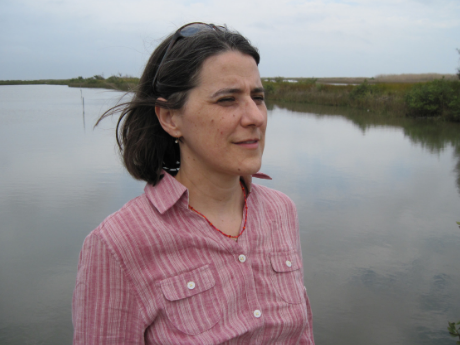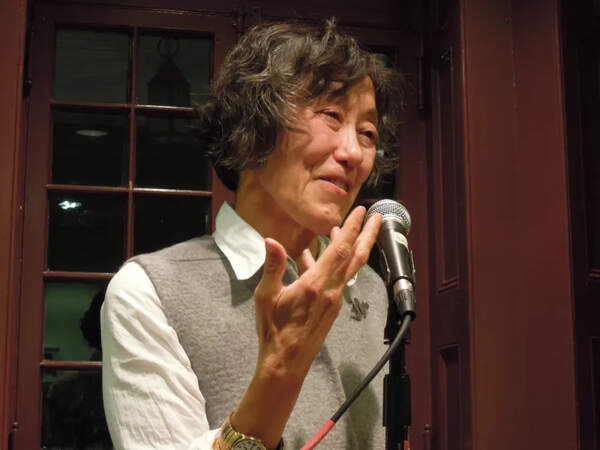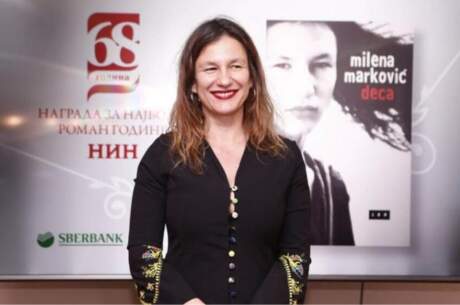Interviews
Questions of Faith: Martha Serpas

"Questions of Faith" is a selection of excerpts from interviews that Dianne Bilyak has conducted over the past decade. The interviews began as her master's thesis for The Institute of Sacred Music & Arts at Yale Divinity School. The poets were queried about their religious upbringing, current practices, and how these may or may not have influenced their writing, as well as general questions related to faith, doubt, and meaning, and more specific questions related to each poet's work.
* * *
Dianne Bilyak: What role did organized religion play for you, growing up?
Martha Serpas: I grew up in southeastern Louisiana, about 80 miles south of New Orleans, and it was almost entirely Catholic—99.5 percent Catholic. It was a very particular kind of Cajun Catholicism that I would categorize as most people being devoted to the sacraments, wanting all the rituals, from St. Joseph's Day altars to the Eucharist to baptisms, confirmations, rosaries, and novenas—everything. But this did not mean that people were necessarily attentive to doctrine or the Pope or anything authoritative like that. I went to a Catholic elementary school until we "graduated" at sixth grade and had to go to public school. My Catholic school was truly integrated, not just in name. That was very influential for me. If I had gone to public school, the way the population was separated, I wouldn't have had any black kids in my class. Also, one of my half a dozen memories about elementary school is the principle, Sister Claire, coming to pull me out of class. I think it was in 4th grade. There was a funeral at the church next door, Holy Rosary, and I don't think anybody could read. The people there probably only spoke Cajun French. So she wanted to know if I would read at the funeral, and if it would upset me. I didn't even know what she meant by being upset. I can remember very clearly, reading and looking out at the coffin in the middle of the aisle. It might have even been the first funeral I went to. It was one of those dissociation moments; I didn't really know how I was supposed to feel and I was looking for cues to figure it out. But that's the kind of relationship that I had with that school. We were treated in a very grown-up manner.
DB: Was it a large parish?
MS: There's a Catholic Church in my part of Louisiana almost every two miles. In our church there were probably a thousand families. We went to Mass every Sunday and my father volunteered his time as the attorney for our church. I also was a reader in church from the time I was in 5th grade.
DB: What role does religion play now?
MS: I attended Yale Divinity School and received my Masters in Divinity. After ten years of wishing I had trained as a hospital chaplain, I finally joined a program during a sabbatical. Most people in the ER don't care about religious differences, but I try to be aware of what practices are more comfortable for them. The social justice aspect of Catholicism—and that was the totality of my Catholic education: sacrificing for the poor, being compassionate, seeking justice—has become even more important to me as the Church becomes more focused on purity codes, dictating who does what when and with little concern for why. The rest—mystery, ritual, and the poetics of sacrament—remain vital to me as I, more and more, connect them to my writing.
DB: When was the first time that you connected poetry writing with divinity?
MS: I'm going to answer it as though you had the word "consciously" attached to that. Because, unconsciously, I think it was always there. But I became conscious of the fact that I was working out a belief system—to use Wallace Stevens's title, "How to Live, What to Do"—through poetry when I was at NYU in my early twenties. And suddenly my father died, and that utterly changed my perspective. Because once you realize your own mortality, I think the writing becomes more paradoxical: it is a reason for being and it means nothing. I became more responsible for myself because he was gone. He had been a safety net, and that was gone. And, more and more, I started recognizing how my upbringing and thinking evolved from Catholicism. And at this stage, I realized, like Simone Weil, that absolute unmixed attention is prayer. And the only time—because I have such a rotten attention span—that I actually lose track of time because I am attending so completely to something is when I'm writing. So for me, writing is prayer; it's unmediated experience of the Divine. Otherwise, in every other moment of my life, it's me watching me live. But in that experience of writing, there's no mediation.
DB: Once we talked about the idea of confessional poetry switching to the poetry of witness. Do you see any trends in contemporary writing with respect to witness?
MS: My interest in witness started with Anne Sexton. I think her spiritual witness is very powerful, and the whole label of confessionalism overshadows it. I tried to look at the poems that were written in first person and say, well, what distinguishes a poem that I would say is a strong poem of witness from a failed "confessional" poem? And I discovered that I thought there was a regard for the audience in the poems of witness. And also that there was more agency on the part of the first person, that in the poems of witness, even though the "I" was sort of dissolving in order to give the reader an unmediated experience of what was happening in the poem, the "I" did not feel acted upon and powerless. It felt like the "I" had a choice, in allowing itself to be used as conduit for this witness. Of course I'm not talking about witness in the Carolyn Forché sense of brutality and injustice. I'm talking about witnessing everyday life events and the use of the first person in dissolving mediation. In a court case and in religious witness, both witnesses have to establish credibility. In both cases, if I'm going to tell you about my experience I have to convince you that I'm credible, and then I have to get out of the way, become transparent, which seems paradoxical.
DB: In Catholicism, there's the sacrament of confession where you go into this space to talk about your wrongdoings and ask for forgiveness, but you can't do it without a witness. Do you think poetry of witness is connected to that process in some way?
MS: Too bad it's called "reconciliation" now. Confession has that wonderful Augustinian joining of professed faith and admitted sin. Isn't admitting wrongdoing having faith in some way? In a partner, in a legal system, in God? Reconciliation emphasizes the end, not the means. The witness is important. In the generation that preceded us, many people only felt safe talking to the priest. They needed a human person to say, "It's okay. Millions of people have done what you did. It'll be okay." The ritual of saying, "I am reflecting on my life, and this is what I see and this is where I am, and this is where I'd like to go," is crucial. When we get the chance to have these conversations about where we are and what we're struggling with—that's sacred. Yes, poetry of witness allows for that space.
DB: In relation to "faith as work," I'd like to know more about your work as a chaplain and if it has informed the writing you are doing now.
MS: It's such an honor to have people in crisis let me into their lives. It's very intense. In some ways, an encounter pulls me into that space of unmixed attention. It's an honor to have people come to hear me read—not equivalent, perhaps, but a mysterious encounter I cannot control and they cannot control. From our interaction some new event transpires that we experience in complete aloneness and also in community. When I am with a family, I experience their confusion or anger and my own, imagined or recalled. That's poetry, isn't it? The pain and loss I see remind me to live more fully, to forget the small stuff. It is better to be in the house of mourning than the house of feasting, says Qoheleth. It leads to more a mindful life, a fuller life.
* * *
Martha Serpas's two collections of poetry areCôte Blanche (New Issues, 2002) and The Dirty Side of the Storm (Norton, 2007). She teaches creative writing at the University of Houston and is a hospital trauma chaplain.
Dianne Bilyak has been nominated for a Pushcart Prize and her first book of poems,Against the Turning, will be released in September 2011. Through the Institute of Sacred Music at Yale Divinity School, she received a graduate degree in religion and literature. She has been interviewing poets for several years and editing the transcripts for inclusion in a manuscript called Poetic Faith. Please visit her website.


